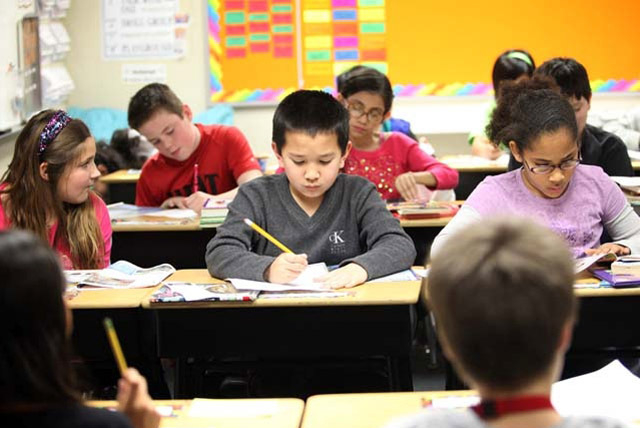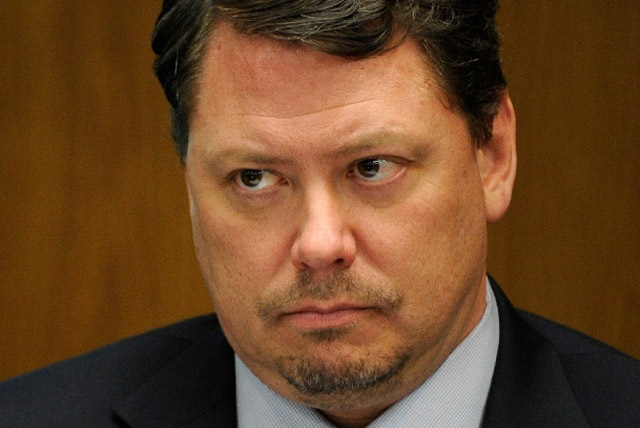National report finds Nevada students have poor chance for success


Nevada children have less chance for success than those in all other states and Washington, D.C., according to the Education Week’s 2014 Quality Counts report.
The nonprofit, national education publication compared states by student performance, school financing, academic standards and other qualities of public schools. It then combined the findings with others outside school — such as parents’ education level, income and language abilities — to determine childrens’ “chance for success” in each state.
The newly released report put Nevada dead last — with a D grade given for chance of student success — for the fifth year in a row. New Mexico was second last behind Mississippi. The indicators found Massachusetts children were best off.
The report is in its 18th year and has included a controversial chance-for-success calculation since 2008. Nevada did best in the first year of the report, ranking 48th with a D+. The Silver State slipped to 50th in 2009 and has been at the bottom, 51st place, ever since.
Although people often interpret Education Week’s report as proof Nevada’s school system is failing, largely due to the Clark County School District, which enrolls more than two-thirds of Nevada’s 445,000 students, schools cannot be entirely to blame, Clark County Superintendent Pat Skorkowsky said Wednesday.
He and Dale Erquiaga, state superintendent of public schools, pointed to the calculation used to arrive at Nevada’s chance-for-success ranking. Only six of the 13 indicators are school-related. Five of those six indicators have to do with pre-school through 12th grade.
“It’s a little unfair to put it on the schools,” said Erquiaga, asserting that the findings are “a clarion call for the entire community to address, not just schools.”
Four of the chance-for-success calculations involve family characteristics. Nevada ranked 37th nationally for family income and 36th for parental employment with 70 percent of children having at least one parent working full time and year round.
Nevada landed 49th in terms of fluency. About 73 percent of parents speak fluent English, well below the 83 percent national average.
Nevada was last for its rate of college-educated parents. Only 32 percent of children have at least one parent with a college degree, short of the 46 percent national average.
Education Week also weighed adult quality of life to determine children’s chance for success. Nevada’s rate of adults who met or exceeded the national median income was 46 percent, 37th in the country.
Only 30 percent of adults have a two-year or four-year degree, ranking Nevada 48th in the United States. Lastly, 66 percent of Nevada adults have steady employment, 3 percentage points behind the national average but ranking low at 45th.
These factors cannot be directly influenced by public schools, Skorkowsky said. But students bring the impacts of their family life to school, bringing challenges to academic success. That creates a cycle of children growing to adults who are likely to be at the same employment and income level as their parents, Education Week contends.
Therein lies the reason for using societal factors and family characteristics as well as student performance to calculate children’s chance for success, showing “the importance of education in a person’s lifetime from cradle to career,” Education Week wrote.
It should come as little surprise then that Nevada schools lag behind other states in almost every indicator. The report lists the state’s graduation rate as 48th in the nation, similar to its chance-for-success ranking. Nevada’s graduation rate is 62 percent, compared to a 74 percent national average.
“It’s not where we want to be as a state, but we are moving in a positive direction,” Skorkowsky said.
Erquiaga also noted improvements to student performance despite the state ranking 49th for school funding. Nevada spends $8,500 per student compared to a $11,900 national average.
Even though only about a third of Nevada students pass the National Assessment of Educational Progress in reading and math, students are improving on the assessment given by the U.S. Department of Education. And Nevada students are improving at a quicker rate than their peers in most states, both superintendents said.
Reading and math tests are given to all fourth- and eighth-grade students. The reading scores of eighth-graders improved by 9.4 points, third best in the nation and double the national average. Nevada’s improvement on the three other national assessments ranged from ninth to 19th best in the country.
“That is fantastic news for our state,” Skorkowsky said.
Erquiaga echoed that but said schools must maintain that pace of improvement for Nevada to shed its designation as one of the nation’s worst public education systems, using the state’s graduation rate as an example.
“We have to graduate students college and career ready,” he said.
Contact reporter Trevon Milliard at tmilliard@reviewjournal.com or 702-383-0279.












